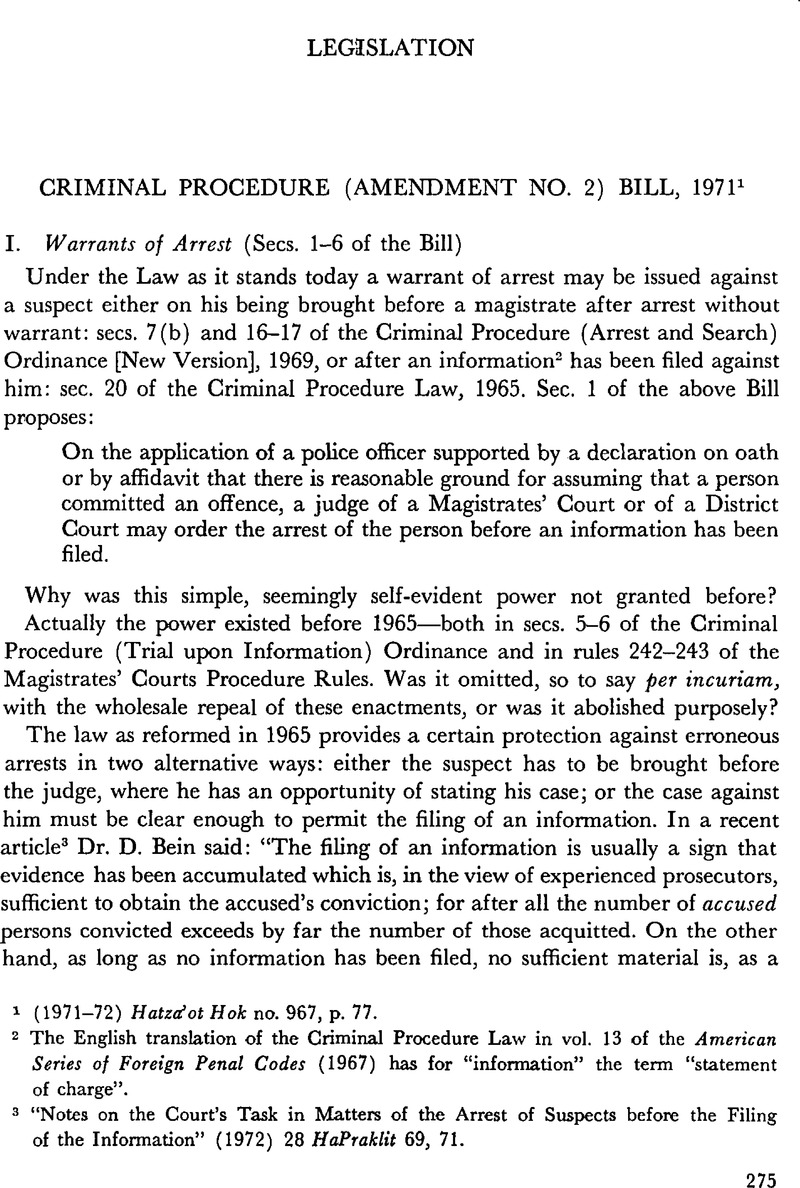No CrossRef data available.
Published online by Cambridge University Press: 12 February 2016

2 The English translation of the Criminal Procedure Law in vol. 13 of the American Series of Foreign Penal Codes (1967) has for “information” the term “statement of charge”.
3 “Notes on the Court's Task in Matters of the Arrest of Suspects before the Filing of the Information” (1972) 28 HaPraklit 69, 71.
4 Criminal Procedure Rules 1966, r. 14.
5 Unreported. The matter is mentioned in the Explanatory Notes to sec. 1 of the Bill.
pp. 77–78. See also Bein, op. cit. supra n. 3 at p. 72.
The author of the decision, Z. Lotan J., kindly informed me that he based it on sec. 10A (now sec. 18) of the Criminal Procedure (Arrest and Search) Ordinance, which forbids the issue of a detention order in the absence of the accused (unless illness prevents his appearance before the judge). In view of sec. 18(10A), which is imported into the Criminal Procedure Law by its sec. 29, Lotan J. even expressed doubts whether the proposed amendment will suffice to permit the issue of orders of arrest in the absence of the accused to any greater extent than today.
6 See Bein, op. cit. supra n. 3 at p. 74.
7 Ibid.
8 Bein, op. cit. supra n. 3 at p. 71. n. 8.
9 Formerly sec. 10(3).
10 See the Explanatory Notes: (1955–56) Hatza'ot Hok no. 249, p. 6 at p. 8, quoting from the “Evidence Draft Law” (published 1952) p. 24, 37.
11 The text says “proved to the satisfaction of the court”—an unnecessary pleonasm.
12 Sec. 119A(b) speaks of “circumstances beyond the accused's control”, but sub-secs. (f) and (g) only of “reasonable cause” for his failure to appear. It is hard to see the reason for different standards in respect of the same matter.
13 See also the Explanatory Notes to sec. 10 (adjournment owing to the accused's unexplained absence) and to sec. 15 (delivery of reasons for acquittal in writing only).
14 Criminal Justice Act, 1967, sec. 11.
15 See Law and Administration Ordinance (Amendment No. 14) Bill, 1971, (1970–1971) Hatza'ot Hok no. 936, p. 316.Google Scholar
16 Samuels, Alec “Notice of Alibi” (1971) 121 NLJ. 31.Google Scholar
17 Sec. 166, Criminal Procedure Law.
18 Secs. 15–16 of the Bill propose amendments of a technical nature which do not seem to call for comment.
19 E.g., § 268(2) of the German Criminal Procedure Code: The reading of the decree must in every case precede the announcement of the reasons of the judgment.